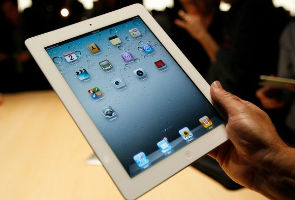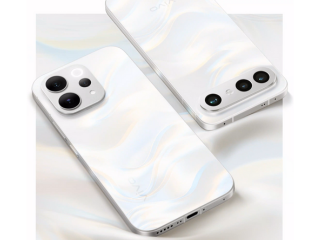- Home
- Tablets
- Tablets News
- Apple fined $2.29 million over Australian '4G' iPad
Apple fined $2.29 million over Australian '4G' iPad

Apple was Thursday fined Aus$2.25 million (US$2.29 million) for "deliberately" misleading Australian consumers about the local 4G capability of its latest iPad.
The tech giant was also ordered to pay Aus$300,000 in costs by the Federal Court in a case brought by regulators, who said the penalty sent a message to global companies that there were consequences for breaching the law.
Justice Mordy Bromberg found that Apple misled people with claims in its advertising implying that the "iPad with WiFi + 4G" could connect with fourth generation cellular networks in Australia, when it could not.
The judgment ruled that the company engaged in conduct liable to mislead the public and contravened Australian consumer law.
"The conduct concerned was deliberate and very serious," Bromberg said.
"It exposed a significant proportion of Australian consumers of tablet devices to a misleading representation."
The Australian Competition and Consumer Commission (ACCC), which initiated the proceedings, said it was delighted with the outcome.
"The $2.25 million penalty reflects the seriousness of a company the size of Apple refusing to change its advertising when it has been put on notice that it is likely to be misleading consumers," chairman Rod Sims said.
"This decision should act as a renewed warning that the ACCC will continue to take action against traders who take risks in their advertising, regardless of their size."
Apple offered in March to refund customers who felt they had been duped, and to publish a clarification about the popular tablet's capabilities.
The product is now advertised outside North America as "Wi-Fi + Cellular" -- a change that came into effect on May 12 -- with a clear caveat on its Australian site that "it is not compatible with current Australian 4G LTE and WiMax networks."
The iPad's 4G capabilities are supported by some networks in the US and Canada.
Matthew Rimmer, an expert in intellectual property at the Australian National University, said Apple had been "careless".
"It shows some of the dangers involved in overhyping products and sets a very important precedent," he said, adding that other countries would take note of the outcome.
Asked if it could open the floodgates to similar law suits elsewhere, he said: "It all depends on the nature of consumer regulations in each country."
Earlier this month, Apple agreed to settle the case with the ACCC.
But Bromberg delayed an official ruling until he had details on how many iPads had been sold and were returned under the refund offer and further information on Apple's financial position.
He said Thursday the risk of contravening Australian consumer law would have been "reasonably obvious" to Apple.
"In that context, and in the absence of any other explanation, the facts to which I have just referred suggest that Apple's desire for global uniformity was given a greater priority than the need to ensure compliance with the Australian consumer law," he said.
"Conduct of that kind is serious and unacceptable."
The iPad was the world's best-selling tablet in the first three months of 2012, outgunning its Android-powered rivals, with sales more than doubling from a year earlier to send Apple's profits soaring.
Apple was not immediately available for comment.
Get your daily dose of tech news, reviews, and insights, in under 80 characters on Gadgets 360 Turbo. Connect with fellow tech lovers on our Forum. Follow us on X, Facebook, WhatsApp, Threads and Google News for instant updates. Catch all the action on our YouTube channel.
Related Stories
- Samsung Galaxy Unpacked 2026
- iPhone 17 Pro Max
- ChatGPT
- iOS 26
- Laptop Under 50000
- Smartwatch Under 10000
- Apple Vision Pro
- Oneplus 12
- OnePlus Nord CE 3 Lite 5G
- iPhone 13
- Xiaomi 14 Pro
- Oppo Find N3
- Tecno Spark Go (2023)
- Realme V30
- Best Phones Under 25000
- Samsung Galaxy S24 Series
- Cryptocurrency
- iQoo 12
- Samsung Galaxy S24 Ultra
- Giottus
- Samsung Galaxy Z Flip 5
- Apple 'Scary Fast'
- Housefull 5
- GoPro Hero 12 Black Review
- Invincible Season 2
- JioGlass
- HD Ready TV
- Latest Mobile Phones
- Compare Phones
- Tecno Pova Curve 2 5G
- Lava Yuva Star 3
- Honor X6d
- OPPO K14x 5G
- Samsung Galaxy F70e 5G
- iQOO 15 Ultra
- OPPO A6v 5G
- OPPO A6i+ 5G
- Asus Vivobook 16 (M1605NAQ)
- Asus Vivobook 15 (2026)
- Brave Ark 2-in-1
- Black Shark Gaming Tablet
- boAt Chrome Iris
- HMD Watch P1
- Haier H5E Series
- Acerpure Nitro Z Series 100-inch QLED TV
- Asus ROG Ally
- Nintendo Switch Lite
- Haier 1.6 Ton 5 Star Inverter Split AC (HSU19G-MZAID5BN-INV)
- Haier 1.6 Ton 5 Star Inverter Split AC (HSU19G-MZAIM5BN-INV)






![[Partner Content] OPPO Reno15 Series: AI Portrait Camera, Popout and First Compact Reno](https://www.gadgets360.com/static/mobile/images/spacer.png)









